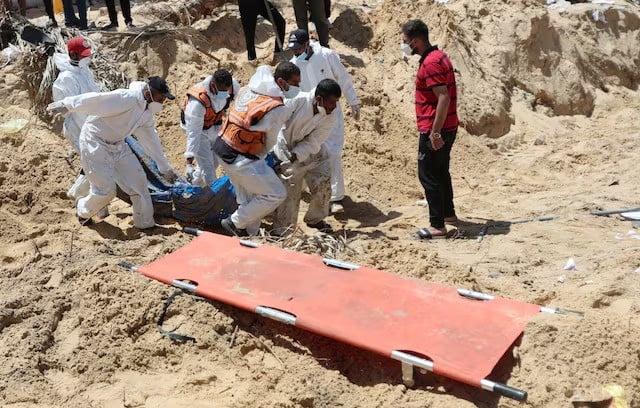UNITED NATIONS:
Pakistan has called on the United Nations and the world community to consider “further measures” against Israel to secure a ceasefire in Gaza and an end to its “plausible genocide” of the Palestinian people in the besieged enclave.
Speaking in the United Nations Security Council’s ministerial-level debate on the Middle East situation, Ambassador Usman Jadoon, deputy permanent representative of Pakistan to the UN, did not specify the measures but pointed out that Israel’s war in Gaza has spread the conflict to adjacent regions and further escalation must be prevented.
“Yet, unless Israel’s war machine is stopped from further slaughter in Gaza, there is an ever-present danger that war and violence will spread and possibly engulf the entire Middle East and beyond,” the Pakistani envoy said.
“Today,” he went on to say that the 15-member Council has “three urgent responsibilities – to halt Israel’s genocidal war in Gaza; to prevent the further spread and escalation of war; and to revive the peace process towards a two-State solution to establish durable peace and security in the Middle East.
Addressing the regional ramifications of the Gaza conflict, Ambassador Jadoon cautioned against the conflict’s spread to neighbouring areas such as the West Bank, Lebanon, Syria, Iraq, Yemen, and Iran. He urged all parties to exercise restraint to prevent further escalation.
Ambassador Jadoon also underscored the timeliness of Palestine’s re-submitted application for UN membership, which, he said, is in accordance with regional initiatives advocating for a two-State solution.
Expressing disappointment over the UN Security Council veto on Algeria’s draft resolution for Palestine’s full UN membership, he pointed to the overwhelming support signalling Palestine’s rightful place in the international community.
Ambassador Jadoon reaffirmed Pakistan’s unwavering support for Palestine’s quest for self-determination, emphasizing that UN membership is a crucial step towards rectifying historical injustices and fostering conditions for meaningful negotiations” Pakistan’, he said, was committed to a two-State settlement based on the 1967 borders, with Al-Quds as the capital of a Palestinian State.
On the opening day of the debate, UN Secretary-General Antonio Guterres urged an end to the deadly cycle of retaliation and called on the international community to work together to avert a full-scale regional conflict, first by ending hostilities in Gaza and ultimately by realizing the two-State solution.
“This moment of maximum peril must be a time for maximum restraint,” said the UN chief.
Detailing limited progress and ongoing challenges despite Israel’s recent commitments to improve aid delivery, he said.
Palestinians are facing widespread starvation and Israel must fully and actively facilitate humanitarian operations immediately.
“The ultimate goal remains a two-state solution,” he said, stressing: “The international community has a responsibility and a moral obligation to help make this happen.”
Spotlighting other conflicts in the region, including in the occupied West Bank, Lebanon and the Red Sea, he said: “We have a shared moral obligation to advance a comprehensive Middle East de-escalation effort, in order to reduce risks, increase stability, and pave the way towards peace and prosperity for the countries and people of the region and beyond.”


